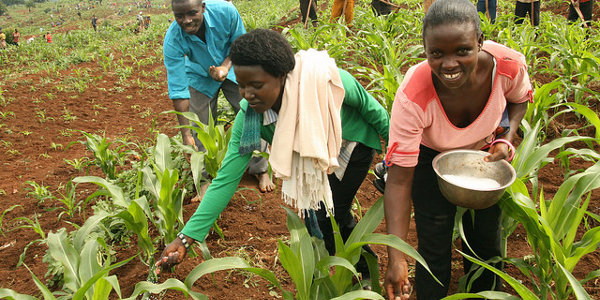Africa’s agriculture sector is at a crossroads. Though it has about 60% of the world’s uncultivated arable land, Africa’s net food import is predicted to grow from US$39bn in 2016 to over $110bn by 2025. Food production is desperately low due in part to the region’s poorly developed climate and weather alert systems to help farmers plan for crop seasons.
In the horn of Africa, farmers in Somalia are grappling with droughts and poor rainy seasons. This has affected food production, making more than five million Somalis food insecure. In West Africa, cocoa farmers in Côte d’Ivoire live in fear because heavy downpour during the rainy season will cause flooding of their farms – a major threat to their livelihoods and the country’s main revenue source. The ordinary farmers in Somalia are unaware of the duration and intensity of drought seasons. Cocoa farmers in Côte d’Ivoire are also poorly informed of the intensity of rains and how they can mitigate the risks to improve cocoa production.
There is a lack of real time access to reliable and usable weather data across Africa. The information is often not available or, even if it exists, is inaccessible, of poor quality or unknown to those that need it most. Farmers don’t know where to obtain efficient information on drought forecasts, rainfall distribution, and pest outbreaks – leading to low agricultural production and food insecurity.
The national meteorological and hydrological services (NMHS), mandated to collect and serve weather and climate data at the country level, operate well below capacity in several African countries. In Africa, about 80% of NMHS are unable to adequately provide this information and related early warnings. Few African countries have the minimum number of operational meteorological stations to adequately make available ground observation data. The World Meteorological Organization (WMO) estimates that, in Africa alone, there is a need for an additional 4,000-5,000 basic meteorological observations. The World Bank estimates that about $1bn is required to modernise the African meteorological services.
Governments alone do not have the capacity and expertise to provide complete solutions, particularly on investment. They will require broader partnerships with the private sector in the agriculture, insurance and telecommunication sectors. These partnerships are necessary for the collection and the delivery of data and for critical services such as risk analysis, commodity availability and prices, index insurance parameters, as well as secure payment schemes.
There are good examples of innovative solutions being deployed already. ECONET, a local mobile phone operator in Zimbabwe, has started large scale weather-indexed insurance for farmers in Zimbabwe. There is the need for strong political support and voices to boost smart systems through partnerships between national authorities, technical agencies, NGOs and the private sector.
African governments must expand financial investments by at least 20% to modernise their NMHS. They must forge strong partnerships with private companies and businesses to scale up and deliver ground observation data both at the national and local levels. These partnerships could offer related services which are important to end-users such as payment schemes, risk analysis, commodity prices and availability and index insurance parameters.
There should be a global approach – led by African governments – that brings together scattered and fragmented climate data interventions and investments. This will help move from the many pilot projects to full-scale projects.
Timely and appropriate climate and weather information plays a critical role in development, helping to better manage climate risks and maximise opportunities. This is particularly the case for Africa’s agriculture.
Author: Stephen Yeboah is a PhD student at the Swiss Graduate School of Public Administration, University of Lausanne



